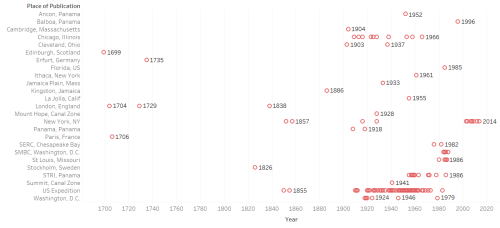When the Biodiversity Heritage Library (BHL) learned of Lidia's research on decolonizing metadata from their databases through a McGill DH social media post, their team embraced her dissertation's goals as part of their wider efforts to decolonize their own archives. After writing a blog post for the BHL community and giving the closing keynote address at the annual BHL Day meeting in April of 2021, Lidia proposed a 3-month internship collaboration to the BHL sponsored by the McGill's Doctoral Internship Program (DIP). Of her internship, Lidia says:
"The main goal was to diversify the BHL's collection and identify through metadata analysis where diversification was most urgent."
Lidia's tasks during her internship included examining metadata in the BHL collections and determining how existing and missing languages and topics are informing future acquisitions from the library in order to make it more diverse. These objectives are part of a larger decolonization strategy that the BHL has adopted while drafting an official acknowledgement of harmful content. Lidia was a part of this task force as a consultant and reviewer for this project.
Lidia's work with the BHL engages with Digital Humanities in two main ways.
- By critically questioning Internet buzzwords like "Open-Access" and "Democratization" and to what extent these processes are actually happening.
- By employing DH methods like web analytics of Latin American audiences and user traffic to the BHL and related sites. Lidia runs SQL queries to extract records from the BHL data files and uses KH coder to generate co-occurrence networks and hierarchical clusters for certain subject lists. She also uses visualization software like Tableau and OCR engines like Tesseract to transcribe texts for topic modelling purposes.


DH research behind the scenes and public impact
McGill's Doctoral Internship Program was a winning combination for both the Biodiversity Heritage Library and Lidia's Hispanic Studies doctoral dissertation in the Department of Languages, Literatures & Cultures. During her internship, Lidia was able to get a better look "behind the scenes" by working directly with central teams and decision-makers as part of the workflow at the BHL. In turn, Lidia's work was well-received and her expertise was valued by the same staff and stakeholders who could make changes and create impact in a global institution.
Lidia encourages her fellow graduate students and DH researchers to propose internships outside of academic spaces since it is meant to be a safe place to browse future career possibilities, to apply existing knowledge, and to learn new skills on the job. For example, Lidia learned how catalogue information is handled at the BHL and validation techniques that she would not have been exposed to otherwise.
Read more about Lidia's work with the BHL in her latest blog series.
